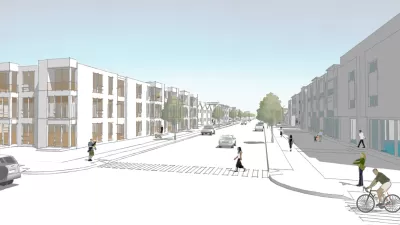Faced with the challenges and controversies of rapid growth, Charlotte has approved a new comprehensive plan and unified development code in recent years.

The city of Charlotte is all set to launch its new zoning code in June, culminating a process that included the adoption of a new Unified Development ordinance in 2022 and a new comprehensive plan in 2021.
An article by Julia Kauffman for WCNC Charlotte presents the news in relation to ongoing development controversies around the city, presenting the arguments of local homeowners that large developments are moving forward despite not fitting the goals of the Charlotte 2040 Comprehensive Plan.
For example, Kaufman mentions a total of 29 rezoning petitions under consideration, “including plans for thousands of apartments near Interstate 485.”
“The massive plan for housing, commercial space, and a school is not consistent with the city's 2040 Plan for that area, but city planners are still recommending city council approve it,” writes Kaufman.
“Land right outside of Mitchell's neighborhood on Mallard Creek Road is zoned for single-family houses. A developer has submitted a rezoning petition to change to build 186 townhomes on the property despite pushback from neighbors,” adds Kaufman. “When Charlotte’s UDO takes effect in June, houses, duplexes, and triplexes could be built on the land. Townhomes would not be allowed unless the land is rezoned.”
The 2040 Plan allows new density as the quickly growing city searches for solutions to rapidly rising housing prices. The UDO seems to be where the rubber is hitting the road with some members of the public. ““We understand the growth, we understand the need for density, but it's unchecked,” says homeowner Reverend Jordan Boyd, as quoted in the article.
The Charlotte UDO is online and available for independent review and assessment. Kaufman did not solicit any comments from members of the city’s planning staff.
FULL STORY: Charlotte's new zoning rules that guide growth take effect in June

Trump Administration Could Effectively End Housing Voucher Program
Federal officials are eyeing major cuts to the Section 8 program that helps millions of low-income households pay rent.

Planetizen Federal Action Tracker
A weekly monitor of how Trump’s orders and actions are impacting planners and planning in America.

Ken Jennings Launches Transit Web Series
The Jeopardy champ wants you to ride public transit.

Washington Legislature Passes Rent Increase Cap
A bill that caps rent increases at 7 percent plus inflation is headed to the governor’s desk.

From Planning to Action: How LA County Is Rethinking Climate Resilience
Chief Sustainability Officer Rita Kampalath outlines the County’s shift from planning to implementation in its climate resilience efforts, emphasizing cross-departmental coordination, updated recovery strategies, and the need for flexible funding.

New Mexico Aging Department Commits to Helping Seniors Age ‘In Place’ and ‘Autonomously’ in New Draft Plan
As New Mexico’s population of seniors continues to grow, the state’s aging department is proposing expanded initiatives to help seniors maintain their autonomy while also supporting family caregivers.
Urban Design for Planners 1: Software Tools
This six-course series explores essential urban design concepts using open source software and equips planners with the tools they need to participate fully in the urban design process.
Planning for Universal Design
Learn the tools for implementing Universal Design in planning regulations.
Heyer Gruel & Associates PA
Ada County Highway District
Institute for Housing and Urban Development Studies (IHS)
City of Grandview
Harvard GSD Executive Education
Toledo-Lucas County Plan Commissions
Salt Lake City
NYU Wagner Graduate School of Public Service





























